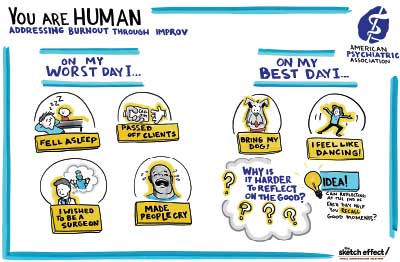Don’t Just Sit There: Learning Labs Offer Interactive Experiences
Abstract
A new interactive session that lets participants feel what it is like to deal with auditory hallucinations highlights APA’s popular and lively “Learning Labs” at the Annual Meeting.
APA’s Learning Labs, one of the most popular session formats at APA’s Annual Meeting, are part of the meeting’s scientific program for the fourth consecutive year. These interactive and collaborative workshops provide an opportunity for attendees to learn important issues central to mental health care in an engaging environment.

A new event at this year’s meeting is the session “Hearing Voices,” chaired by Mary Kay Smith, M.D., a member of APA’s Council on International Psychiatry and Scientific Program Committee. This session will allow attendees to try to perform common tasks while experiencing a range of distracting auditory stimuli. The goal is to explore previous assumptions about those who hear voices and identify ways to support individuals more effectively in their recovery journeys. Attendees should bring their cellphones and earbuds to participate.
The following are other popular sessions making a comeback this year:
Medical History Mystery: In this interactive workshop reminiscent of the television series “House,” audience members will piece together clinical clues and work with an expert panel to diagnose a patient with a complex medical history and an unusual set of symptoms. Ken Ashley, M.D., an assistant professor of clinical psychiatry at Mount Sinai University, will lead this session.
You Are Human: Addressing Burnout Through Improv: Participants will learn to sing, shout, and laugh away stress and build resilience. Though many people might think of improv as just a form of entertaining humor, APA Director of Education Tristan Gorrindo, M.D., and improv coach Ashley Whitehurst will demonstrate how the fundamentals of improvisation can be therapeutic. Attendees will learn to open themselves up and improve their ability to communicate and connect with other people. Improv also teaches traits like adaptability, spontaneity, and empathy, which are key to dealing with patients and medical colleagues.
Expert Debate: Audience members will team up with one of two experts to debate their position on a controversial medical issue. This year’s topic is physician-assisted suicide, and leading the debate teams will be Mark Komrad, M.D., the ethicist-in-residence at Sheppard Pratt Health System in Baltimore, and David Pollack, M.D., a professor of psychiatry at Oregon Health and Science University. Ron Winchel, M.D., of Columbia University will moderate the session. ■
More information about APA’s Learning Labs will be posted in the near future here.



